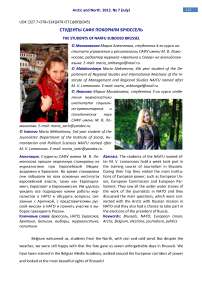The students of NArFU conquered Brussels
Автор: Malahovskaya M.A., Ivanova M.M.
Журнал: Arctic and North @arctic-and-north
Рубрика: Sociological sciences
Статья в выпуске: 7, 2012 года.
Бесплатный доступ
The students of the NArFU named after M. V. Lomonosov hold a week took part in the training course of Journalism in Brussels. During their trip they visited the main Institutions of European power, such as European Union, European Commission and European Parliament. They saw all the under water stones of the work of the journalists in NATO and they discussed the main questions, which were connected with the Arctic with Russian mission in NATO and they also had a chance to take part in the elections of the president of Russia.
Brussels, NATO, European Union, Arctic, Belgium, elections, journalism, politics
Короткий адрес: https://sciup.org/148320430
IDR: 148320430 | УДК: [327.7+378+324](470+571)(493)(045)
Текст научной статьи The students of NArFU conquered Brussels
Belgium welcomed us, students from the North, with rain and cold wind. But despite the weather, we were still happy with that the fate gave us seven unforgettable days in Brussels. We have been trained in the Belgian Media Academy, walked around the European corridors of power and looked at the most beautiful sights of Brussels
They gave us a rose for the vote
Landed on Belgian Land on March 4. It seems, that we left in Russia all the problems, con--‐ cerns, and presidential elections as well. But it was a mistake. We should done out civic duty. Bel--‐ gians would not understand us, because for them the presidential election --‐ is sacred. Therefore, the plane went straight to the polling station, located at the Russian Embassy in Belgium.
1 703 people came with us to the Russian Embassy to vote. Russians, who were living in
Brussels, showed to us, that they cared about their country. The same words told to us a journal--‐ ist, a former correspondent of the "Russian Service» BBC Elena Prokhorov, which we met.
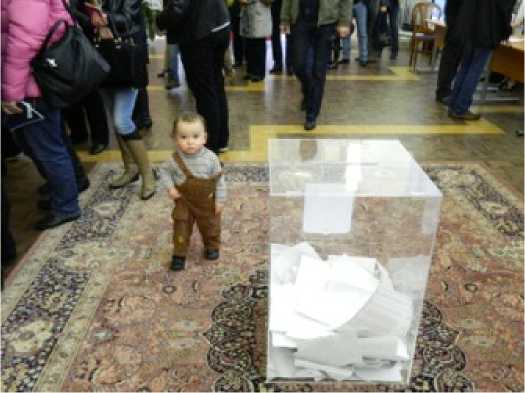
And how not to vote in such a won--‐ derful place The fact that in this area car--‐ ried out the election process, it was only possible through the transparent boxes for the voting, located in the center of the room. Everything else --‐ are the music, friendly people, the red carpet, buffet, where ypu had a chanse to find real Russian caviar, syshki and pryaniki --‐ as if it was in the cozy en--‐ vinronment at home.
Voted with absentee certificates. Our compatriot was not able to take it in Russia when he came to his polling place, and he was not found in the lists and he was rudely sent home. Here, he was allowed to vote only by the passport. Without any problems.
"At the polling station abroad can vote any adult person --‐ a Russian citizen with a valid passport, the presence of the absentee certificate is not so necessary", --‐ explained to us the first secretary of the Russian Embassy in Belgium, PEC member Georgy Kuznetsov.
Another minor, but very pleasant moment of voting in Brussels – is, that those who voted for the first time, were given not boxes with pens, as it is typical to Russia, but were given real buds red roses, which were grown in Belgium.
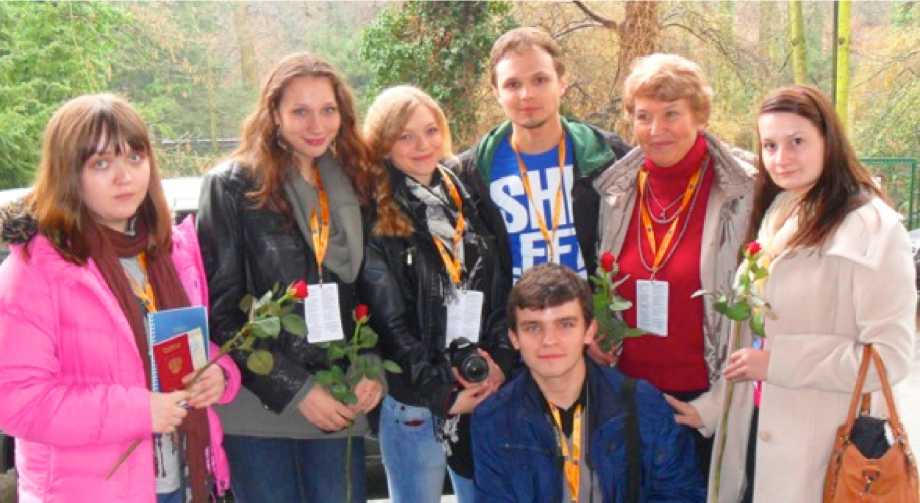
The trip along the halls of the European Power
Internships in Belgium was made possible thanks to the invitation of the European Media
Academy. As told to us its leaders, for them students from NarFU named after M.V. Lomonosov were not the first study group, but the only one, which with a genuine interest visited and took a part at all the seminars and not miss a single one in the busy schedule of the day. And how can you miss something? Because everything was so interesting: from the work in the European higher au--‐ thorities to the legends of the creation of the famous Belgian chocolate.
Training schedule was very tight. On the second day in Belgium, we visited the press service of the Euro--‐ pean Commission, have learned how to operate the ra--‐ dio and television station of the authority, as organized space to work with international journalists, and spoke with local reporters and with the staff for working with the media.
We were surprised with full disclosure of all of the European institutions to the press. Having been one of the press conferences, we made sure that the journal--‐ ists without any approvals and warnings to ask ques--‐ tions. As later explained to us the head of Media Acade--‐
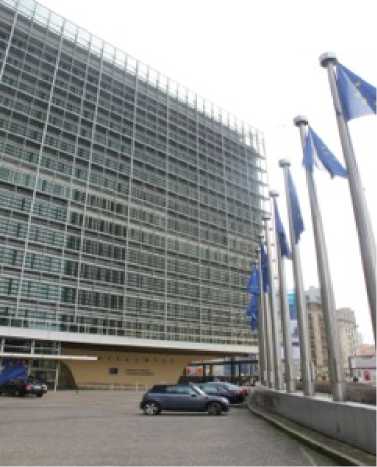
These words of Leonid Alexandrovich confirmed when we visited on the third day the Eu--‐ ropean Parliament. We were shown several rooms for the journalists, where they work in the cov--‐ erage of some events: the rooms are well--‐equipped with the technical side, and the halls, where the meeting with the journalists, can accommodates up to 2600 people.
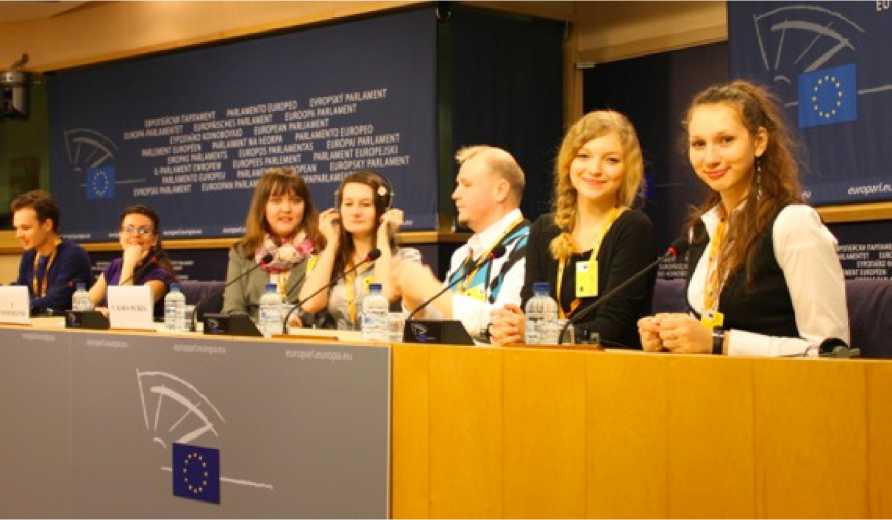
Representatives of the European Parliament of the work with Media told about the rules of the accreditation about the technical and informational work of the press service and, mostly im--‐ portantly, how to negotiate with any member of the interview. The main thing or the credo of the Belgian journalists – is that the authorities there for the press, not oppositely.
On the same day we were able to chat with the deputy of the European Parliament Tatjana Ždanok and visited the conference hall of Anna Politkovskaya.
Visit to the European Council has become the most politically informative event. This au--‐ thority was the last piece of the puzzle, which has resulted assemble a complete picture of the three institutions of the European authorities.
In the NATO they speak with us on Russian language
The most striking impression, of course, was a visit to NATO. We managed to communicate with the officers of the public diplomacy of NATO and representatives of the Russian mission to NATO. Despite the fact that all of our meetings were «off record», we have been able to get an--‐ swers to many important and really relevant day issues not only for the Archangelsk, but for Russia as a whole. These were the issues that concerned the relations between Russia and NATO missile
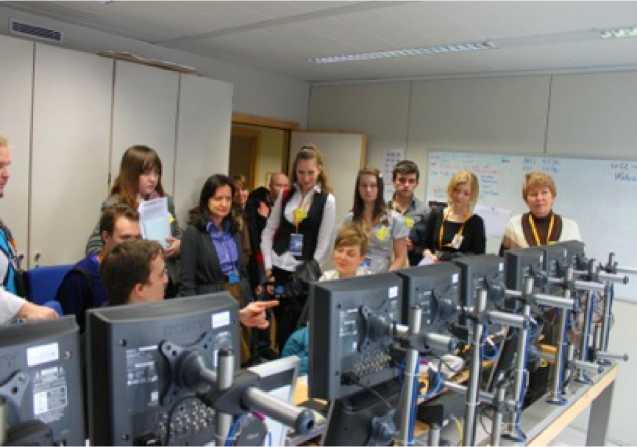
defense issues and disputes that occur Russia and other countries of the Arctic five. We were real--‐ ly interested in the question: "The Arctic – is an area that is open to dialogue, or the Arctic – is an area of the war?'
We managed to make sure that in NATO work not just diplomats, but real professional actors and experts in their field. The working language in NATO was Russian, so conversation was taking place easily. NATO officials told us that the countries, which are the part of the alliance, did not view Russia as an enemy, as the "Cold War" and the "arms race" had long been over, and all countries are open to dialogue. I want to believe, but somehow it turns easily. At the end of our conversation, we came to the con--‐ clusion that NATO must fight with the negative image that exists in the minds of Russians to the alliance. In addition, we were able to raise issues relating to the accreditation of the journalists, as well as existing or not existing "blacklist" for the journalists. Unfortunately, video and photography in the NATO were taken, but the events of this day would be remembered forever.
Belgian Television
During a visit to the French television we were able to chat with someone who has worked for over thir--‐ ty years in RTBF --‐ Patrick Verdun. Mr. Burden was our guide, he took us through the many intricate corridors of the television and tried to uncover some of the mysteries and secrets of his work. He showed us many an office and studio, filled with the latest equipment. We man--‐ aged to attend even when recording a TV. Finally, he told us about the work of the journalists, their endless busi--‐ ness trips and record TV programs.
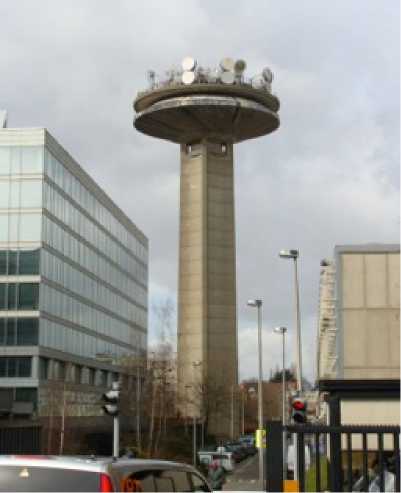
What is important for the Belgians?
During the internship, despite the fact that the day was oocupied seriously by the minute, we still had time to observe the daily life of Brussels. Maybe the fact that we came to this country as tourists, we found that life is much better and easier. The people are friendly, the streets are kight, everybody seemed to know what they wanted, what to do and what to expect from the fu--‐ ture. Belgians got up at seven in the morning, went to work, drunk coffee, eat waffles, walked, sat
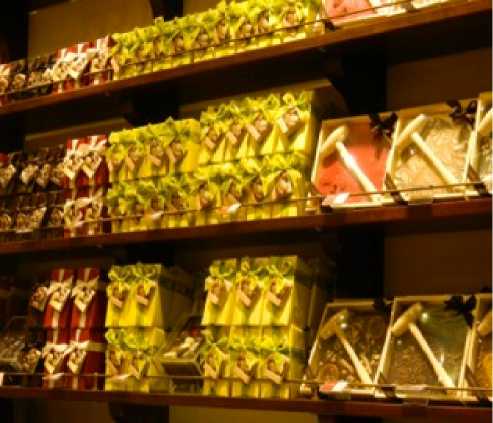
in the bars in the evenings, a week planning parties and celebrations and knew exactly what they will do in two weeks.
Indigenous people have long ceased to live in the city, they prefer country houses, leaving in the center for the visitors --‐ tourists and immigrants. By the way, it was not so sweet there with the emigrants. The EU is ob--‐ sessed with human rights, brought the city to the point that the indigenous people are diffi--‐ cult to find work, especially in the service: it has long been all employed immigrants. Because of this, Brussels youth aspires to leave the country to find work abroad.
But even these facts do not overshadow the Belgian life. So much new and interesting things we learned about this country For example, that on the street can be treated with pro--‐ prietary Belgian waffles. A stay in Brus--‐ sels and not try them – it means, that you spent time in vain. They are sold everywhere and it was just 1 euro. Fill--‐
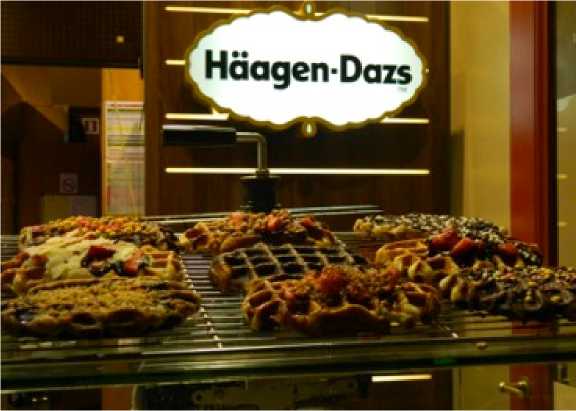
ing for them is different and the most delicious. We managed to try also Belgian chocolate.
Also new to us was the fact that the bars where drunk beer and listened to music, they were beautifully and originally decorated. Disco bars filled with music and funny pictures. Com--‐ munication drinks --‐ everything flows like water. For those who would just like to have a business meeting or a chat with an old friend --‐ a lot of quiet bars with a rich history and decor. For extreme, unusual thirst impressions always open bar "coffin": dark, gloomy, with coffins instead of tables, and skulls instead of glasses for drinks. Only here to find all these places is not easy. They hid in the narrow streets, spreading like streams in all directions from the main square of the city --‐ the Grand Place.
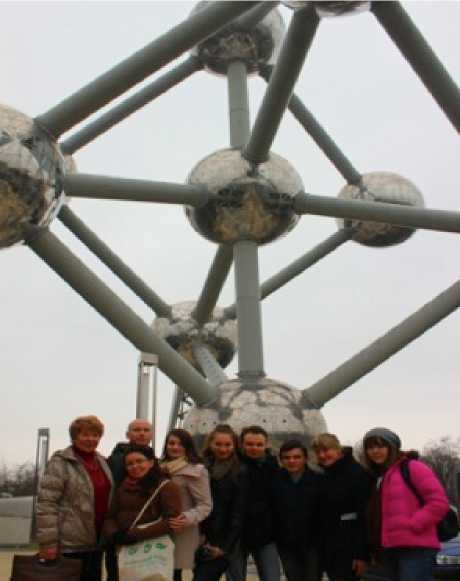
First place in the grandeur and elegance in architectural terms is rightfully the Grand Place, located in the center of Brussels. Buildings sur--‐ rounded the area from all sides even square, are the greatest masterpieces of architecture in the open. Area is never empty. During the day and es--‐ pecially at night it is filled with tourists and local young people, sitting on the granite in close quar--‐ ters. Here are selling paintings, souvenirs, and draw portraits. It also works photographer and an--‐ imators.
In general, about the architecture of the city can talk a lot and for a long time. High, gothic medieval castles and churches coexist with buildings of the modern style, which distinguishes the desire to create both beautiful and functional buildings. Perhaps this is the beauty of Brussels.
Modern and beautiful city, but it has not lost its architectural heritage.
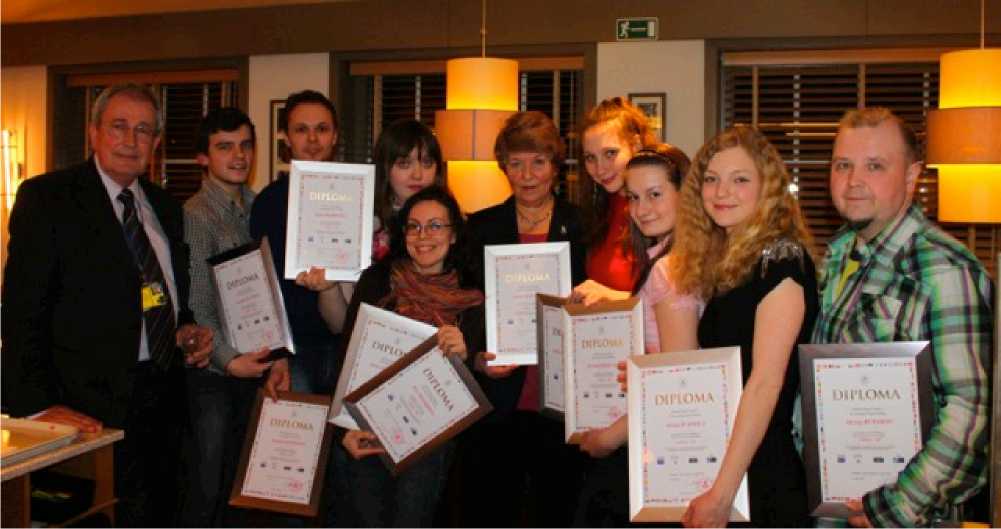
We will definitely come back
Seven days of the internship passed in one breath. Every day, was exhausted and tired, we returned to the hotel, sat down at the computer and wrote materials that we had seen and expe--‐ rienced, trying to memorize all the little details of the day. Such as the way we communicated with members and journalists EU, walked around the cobbled streets, enjoy the fragrance and flavors of the famous Belgian waffles, and of course, watching the local attractions.
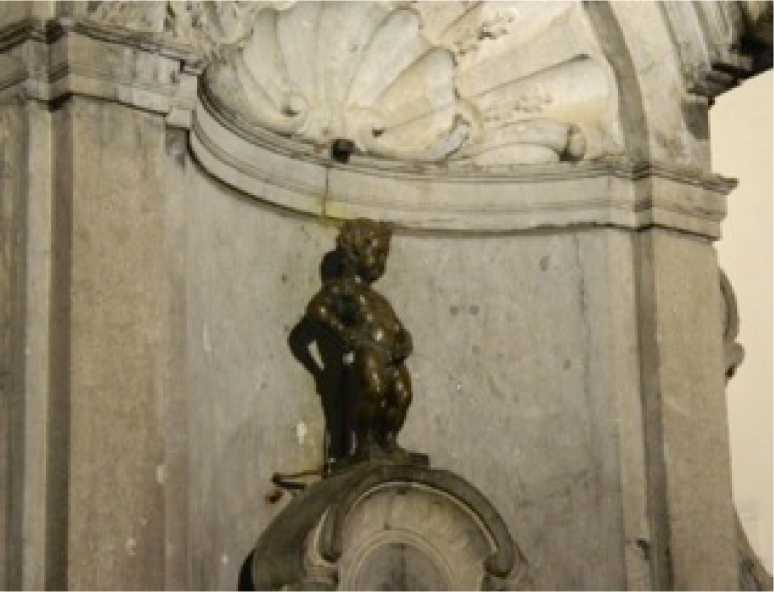
Throwing a coin into the fountain of a famous "Manneken Pis", hidden between the streets of Brussels, we wish one common desire for all of us: to come to Brussels again. And our wish will come true
Reviewer – Sokolova Flera Harisovna, Doctor of History, Professor

